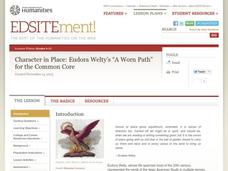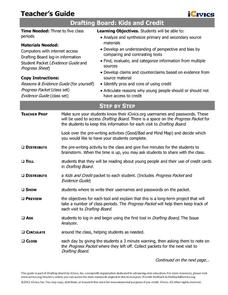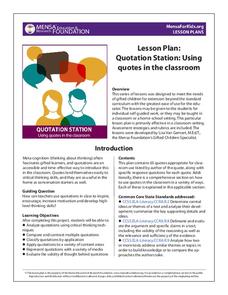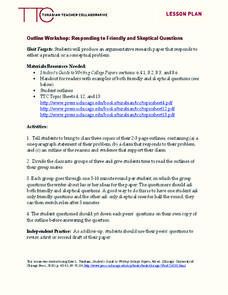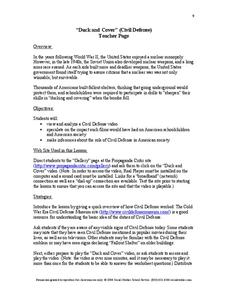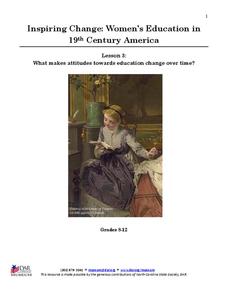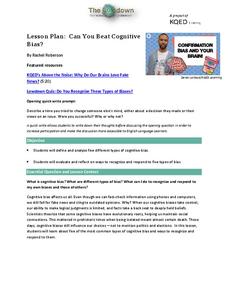National Endowment for the Humanities
Character in Place: Eudora Welty’s “A Worn Path” for the Common Core
How do writers use the interaction between elements like characterization and setting to create meaning? Readers of "A Worn Path" create a series of comic book-style graphics of Eudora Welty's short story and reflect on how Welty uses...
iCivics
Drafting Board: Interest Groups
Does the influence of interest groups harm a political system? Your class members will analyze the role of interest groups in American politics, as well as consider the effect of perspective, bias, loyalty, and the First Amendment.
iCivics
Drafting Board: Kids and Credit
Should kids under the age of 18 be given access to credit cards? Learners identify pros and cons of using credit, develop claims based on evidence, and finally argue reasons for or against credit for minors.
iCivics
Drafting Board: Military Intervention
Should countries use their militaries to stop humanitarian crises in other countries? Learners make claims, organize their reasoning, and provide evidence for their arguments with this rich resource.
iCivics
Drafting Board: Electoral College
Should the president of the United States be voted by the Electoral College or the popular vote? Your young historians will consider the pros and cons of the Electoral College, and make an argument using reasons and evidence provided in...
iCivics
Drafting Board: Community Service
Should schools impose community service graduation requirements? In the final lesson of the Drafting Board series, learners solidify their practice of crafting an argument supported by sound reason and evidence.
Thomas Jefferson Foundation
Personal Morals vs. Political Moves
Was Thomas Jefferson a hypocrite? That is the question facing class members as they examine excerpts from documents that relate to Jefferson's beliefs about slaves and slavery.
Roy Rosenzweig Center for History and New Media
The Homestead Act
To understand how the Homestead Act of 1862 changed the US and the lives of the people during that time, class members examine primary source materials including letters, broadsides, and images. They then assume the voice of a...
MENSA Education & Research Foundation
Quotation Station: Using Quotes in the Classroom
An informative list compiled with quotes, authors, and discussion questions, along with 20 out-of-the-box application ideas, make up the collection of lessons geared to spark dialogue and creative thinking about quotations.
Turabian Teacher Collaborative
Outline Workshop: Responding to Friendly and Skeptical Questions
Answering questions is the best way to hone and revise your argument. Foster receptive writers with a workshop activity that promotes peer editing and argumentative writing skills. Given lists of both friendly and skeptical questions,...
Social Studies School Service
“Duck and Cover” (Civil Defense)
Bert the Turtle models for viewers the 1950s Civil Defense Duck and Cover strategy that was supposed to protect citizens from a nuclear blast. After viewing the video, watchers are asked to consider the motivations of the producers of...
Channel Islands Film
Santa Cruz Island - Writing for Information
After re-viewing a documentary segment on the restoration of Santa Cruz Island,, individuals craft an essay in which they compare the views of the various stake holders featured in the video and identify the point of view they find the...
Channel Islands Film
Cache: Lesson Plan 1 - Grades 9-12
Archaeologists have discovered a cache of Native American relics. They want to preserve these relics by removing them from the rapidly eroding site to a lab where they can be studied. Native American traditions demand that the items be...
Channel Islands Film
Arlington Springs Man: Lesson Plan 3
Imagine being part of a team of scientists that discover the oldest human remains in North America. Imagine being part of the crew that documents this discovery. Class members get a change to be part of such an exciting adventure in a...
Museum of Tolerance
Documents That Shape Society
The Bill of Rights is a foundational document of American democracy, much like the Nuremberg Laws were a foundational document of the Reichstag of Nazi Germany. But that's where their similarities end. Engage high schoolers in a...
PBS
Before We Travel, We Research
Context is key when it comes to historical research. Prior to field research, class members learn as much as they can about the site they are going to visit. Groups investigate and prepare presentations about the history of the site, the...
Stanford University
Lesson Plan: The Children's Crusade and the Role of Youth in the African American Freedom Struggle
Young people played significant roles in the Civil Rights movement. Class members examine the contributions of Barbara Johns, Claudette Colvin, Mary Louise Smith, and the children of Birmingham,...
Library of Congress
Thomas Jefferson's Library: Making the Case for a National Library
The United States Library of Congress, the largest library in the world. But such was not always the case. The library was destroyed during the War of 1812. In a persuasive letter to Samuel H. Smith, Thomas Jefferson offered to sell his...
Daughters of the American Revolution
Lesson 1: How Do Society’s Expectations Influence Education?
The history of women's education can be traced back to the delicate stitching of student samplers from the 19th century. Modern-day pupils examine and analyze four primary sources, three of which are images of embroidered samplers, which...
Daughters of the American Revolution
Lesson 2: How Do We Determine the Value of Education?
Have women always had the same educational opportunities as their male counterparts? Young historians read an 1819 essay by Emma Willard on the state of female education in the 19th century before discussing their views regarding women's...
National Society Daughters of the American Revolution
Lesson 3: What Makes Attitudes Towards Education Change over Time?
The struggle for women's rights is not unique to this generation, or even to the 20th century. Class members explore the conflicting opinions of Alexander Graham Bell and his wife, Mabel Hubbard Bell, regarding women's pursuits of higher...
Albert Shanker Institute
Dream Under Development
As part of their study of the 1963 March on Washington, class members do a side-by-side comparison of the original text of Martin Luther King's "I Have a Dream Speech" with a transcript of the speech he delivered. The take away from the...
NPR
Can You Beat Cognitive Bias?
In a time of fake news, media manipulation, and Internet trolls, a resource equips learners with the tools they need to recognize and combat resources that are designed to appeal to our cognitive biases. Introduce learners to five...
Scholastic
Consider the Source
Who is more trustworthy when it comes to marijuana: a high school student, or The National Institute on Drug Abuse? Sources matter when reading informational text. Help teenagers discern which facts are true with an activity that focuses...
Other popular searches
- European Union Objectives
- Health Education Objectives
- Subjective and Objective
- Drama Lesson Plans Objective
- Objective Description
- Objective Complements
- Objective Case
- Concert Band Objectives
- Objective Subjective
- Abstract/non Objective Art
- Objective Case of Nouns
- Objective 6


